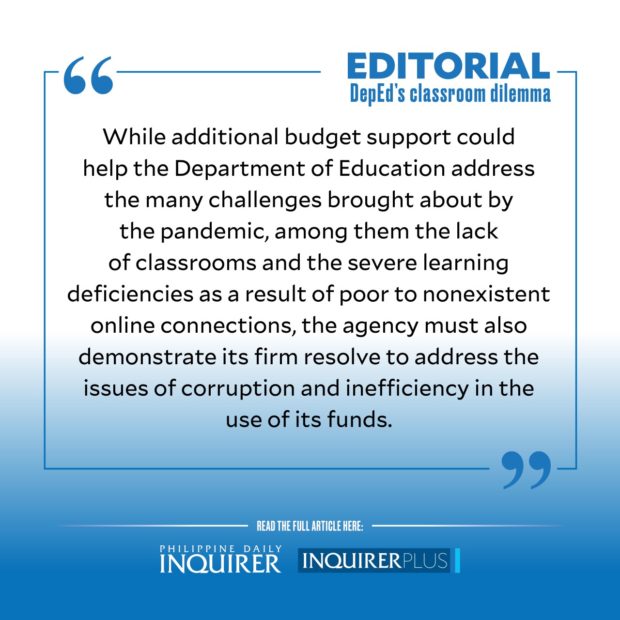DepEd’s classroom dilemma
 The Department of Education (DepEd) last week said it needs at least P1 billion to repair classrooms that were damaged in the wake of a magnitude 7 earthquake that struck Abra and northern Luzon on July 27.
The Department of Education (DepEd) last week said it needs at least P1 billion to repair classrooms that were damaged in the wake of a magnitude 7 earthquake that struck Abra and northern Luzon on July 27.
The DepEd Disaster Risk Reduction and Management Service said that as of July 30, 9,903 schools in the Ilocos, Cagayan Valley, and Cordillera regions, with over 1,000 classrooms, were totally or partially damaged by the quake. This is a huge blow to the resumption of classes on Aug. 22, with students required to return to full face-to-face learning in November.
The setback also highlights the perennial problem of classroom shortage that has hobbled the right of every Filipino to have quality education as mandated in the Constitution. Every year, the education sector gets the biggest slice of the national budget to fulfill the government’s obligation to provide free public elementary and high school education.
Article continues after this advertisementThis year, the education sector received a P788.5 billion share of the budget, which covers funding for DepEd, the Commission on Higher Education, the Technical Education and Skills Development Authority, and state universities and colleges. The DepEd got P631.77 billion or 12.58 percent of the 2022 national budget of P5.02 trillion.
Yet, despite this budget prioritization, classroom shortage has persisted. This longstanding problem has become more acute as schools reopen for physical classes after two years of online learning necessitated by the COVID-19 pandemic. Some classrooms, too, were used as quarantine facilities and have yet to be restored to serve their original purpose.
In her first order as education secretary, Vice President Sara Duterte directed all schools to cease implementing purely online and blended learning after Oct. 31, and move to full in-person classes. The order also urged schools to “implement physical distancing whenever possible,” but left it to the schools to determine the cap in class size.
Article continues after this advertisementFor sure, health security remains an overriding concern among educators, parents, and students, since the COVID virus is still around, with new and more contagious variants on the rise, even as the monkeypox virus has become another threat.
But with the order to conduct full physical classes, the DepEd projects a shortage of 400,000 classrooms if class size is capped at 20 students to follow physical distancing as part of health protocols. A 2021 aide mémoire by former DepEd undersecretary Alain Pascua noted that the classroom shortage could be eased if 40 to 45 students were packed in a class, but that this would result in “minimal to no physical distancing.”
This is certainly a dangerous scenario, and a dilemma that the DepEd must resolve before hastily resuming face-to-face classes. Close physical contact could result in students getting infected with the COVID virus and spreading it among family members.
In a recent forum, Lizamarie Olegario, an associate professor at the College of Education in UP Diliman, expressed the common sentiment among teachers about class size and the lack of classrooms. Two years of the pandemic and yet no preparation had been made, she protested.
While additional budget support could help the DepEd address the many challenges brought about by the pandemic, among them the lack of classrooms and the severe learning deficiencies as a result of poor to nonexistent online connections, the agency must also demonstrate its firm resolve to address the issues of corruption and inefficiency in the use of its funds.
Last week, the Commission on Audit (COA) called out the DepEd for the purchase of P2.4 billion worth of laptops for use by teachers in conducting online classes last year. COA said the department did not question the price and specifications given by the Procurement Service of the Department of Budget and Management (PS-DBM). This was the same agency involved in the grossly overpriced pandemic supplies in the billion-peso contract cornered by the underfunded firm Pharmally. The PS-DBM jacked up the laptop price from P35,046.50 to P58,300, despite the fact that the laptops were equipped with outdated processors.
“The adjustments made thereof resulted in pricey computer laptops with low-end processors, which (overprice) adversely decreased the number of intended beneficiaries from 68,500 to 39,583 public school teachers,” said COA. DepEd passed on the blame to the controversial PS-DBM, when it should have done due diligence and checked out comparative units, prices, and specifications before approving the purchase.
The COA finding should be a good start for the new DepEd secretary to prove her mettle in whipping this lumbering, corruption-ridden bureaucracy into shape. The classroom-COVID debacle should sharpen the agency’s skill as well in adapting to new and harsh realities that may, if resolved, result in a better learning place for millions of students returning to full in-person classes in November.
For more news about the novel coronavirus click here.
What you need to know about Coronavirus.
For more information on COVID-19, call the DOH Hotline: (02) 86517800 local 1149/1150.
The Inquirer Foundation supports our healthcare frontliners and is still accepting cash donations to be deposited at Banco de Oro (BDO) current account #007960018860 or donate through PayMaya using this link.
















